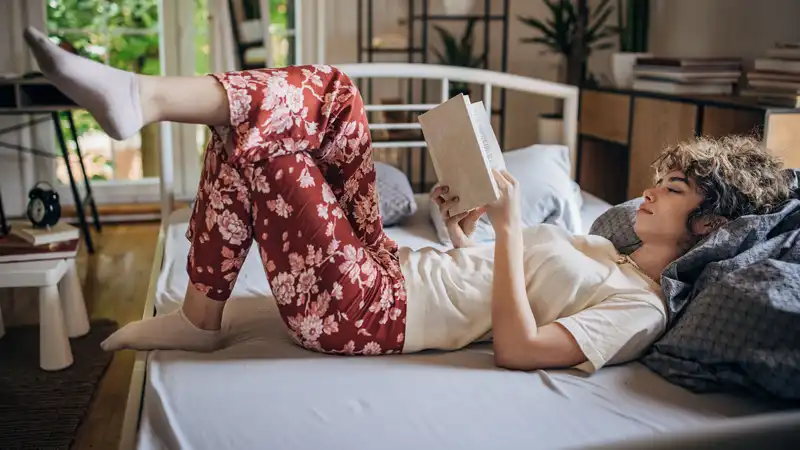Although nighttime habits may be associated with babies and young children, adults can also improve their sleep by establishing bedtime routines Experts say that healthy sleep habits help prepare the body for sleep by performing the same set of activities at the same time up until bedtime, helping to speed the onset of sleep
One in three adults in the United States say they do not get enough sleep Because sleep deprivation can have serious health consequences, including cognitive decline in the short term and increased risk of cardiovascular problems in the long term, the process of improving overall sleep quality, such as investing in a mattress that best suits your sleep needs, is always worth paying attention to
But what exactly are nighttime habits? Sleep expert, licensed psychologist, and neuroscientist Lindsey Browning, PhD, says, "The concept of bedtime habits is drawing people's attention to the fact that what we do naturally with our infants and babies is a really good idea for everyone" Let's take a closer look at what healthy nighttime habits look like for adults and how to establish habits that are relaxing for you
For more sleep tips, check out our feature on how to make your bed with the Scandinavian Sleep Method
A nighttime routine (also called a bedtime routine) is a series of activities leading up to bedtime Dr Browning explains, "A bedtime routine means doing the same things in similar steps"
"We give our babies bedtime routines without thinking We change their diapers, give them milk, give them a bath, read them a story, and put them to bed That is our bedtime routine And as our children get older and we become adults, we stop the bedtime routine, we stop doing the same things before bed, and we think that if we magically turn off our brains, we can sleep"
Many of us have fallen into unhealthy habits that make it difficult to fall asleep, such as scrolling on our phones late at night or working until just before bed, instead of the habit of going to bed at night These habits make it difficult to switch off and fall asleep, which can lead to sleep deprivation
However, we can shorten the time it takes to fall asleep by incorporating a series of activities that help us relax and prepare both our brain and body for sleep Drinking chamomile tea, spraying lavender on the pillow, and other consistent sleep cues can signal to the brain that it is time to sleep
"Bedtime routines are really about getting to sleep," says Dr Browning 'It's about moving from the busy, stressful labor of the day to sleep We can only sleep when we are relaxed If we are anxious, we can't sleep So anything that relaxes us, literally anything, helps us sleep"
Choose a series of activities that you find relaxing You might say, "Listen to classical music, turn on a light, light a candle," says Dr Browning But there are a lot of people who don't like classical music, and actually putting on classical music can really irritate them So you have to find something that relaxes you"
According to Dr Browning, the evening routine should be between 30 minutes and an hour Any longer than that and it begins to feel like a chore and becomes difficult to continue
"In fact, [long bedtime habits] are very unhelpful If you think you need more than an hour, and that lasts into the evening, and you would rather not do the things you want to do to improve your sleep, that can be unhealthy," says Dr Browning That can be unhealthy
By her own admission, Dr Browning sleeps very well every night This is because she has established a nightly routine that prepares her body for sleep In order for the brain to associate a certain set of behaviors and smells with sleep, it must consistently follow the same routine
"If you do the same thing, be it a certain smell, or reading a book in bed, or using the same snug pillow in bed, they will be associated repeatedly and help send signals to the brain
If you want to fall asleep faster, you may need to consider skipping the news Just like the bedtime routine you set for your baby or child, your bedtime routine should not be too stimulating Therefore, it may be best to avoid anything too thought-provoking or distressing [For example, watching the 10 o'clock news may not be something you should do before bed When I go to bed, I find myself thinking about the world and not being able to sleep"
The bedroom should be a space used only for sleep (or sex) and should not be a place to check work email or write a to-do list Dr Browning adds, "You should stick to what you do in the bedroom
"Bed is a place to sleep, not a place to scroll through your phone Do not reply to emails in bed Don't get up first thing in the morning, open your laptop, and start doing a couple of things before you get up Get out of bed to do those things Then bed will only be about sleep and sex"
Resist the urge to check your phone one last time before bed The blue light emitted by cell phones not only interferes with your body's natural melatonin production (the hormone responsible for feeling tired), but can lead to spikes in anxiety, making it almost impossible to fall asleep
"If you check your cell phone between 30 minutes and an hour before bed," Dr Browning explains, "you are more likely to be exposed to something new, something you have to think about or deal with, whether it is a friendship or work
Regardless of what your bedtime routine had been up to that point, checking your phone one last time may make you feel less tired and more anxious about having to do something instead










Comments